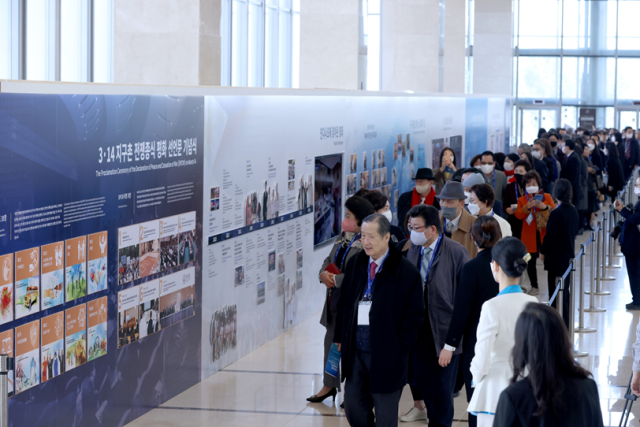By — Shyamal Sinha
Under the theme of “Institutional Peace: Strengthening Communication to Build Trust”, an international peace NGO, Heavenly Culture, World Peace, Restoration of Light(HWPL), held its 7th Annual Commemoration of the Declaration of Peace and Cessation of War(DPCW) from March 14th to 19th in 41 countries from Africa, Europe, North America and Asia.
With the foundation of “Declaration of Peace and Cessation of War (DPCW)” as a tool for comprehensive global peacebuilding cooperation, 7,000 people in the fields of politics, legal profession and religion, education, media, women and youth, joined the event where the participants were shared the cases of conflict prevention, mediation, and resolution to institutionalize peace as a universal culture and norm.
“This declaration, comprised of 10 articles and 38 clauses, aims to restore the spirit that served as the basis for the establishment of the United Nations and to achieve sustainable peace by promoting the universal values of the global community. The DPCW contains the message of no war, peace between nations and societies, friendly relations, prosperity, happiness, this is a simple message and everyone can relate to this message,” said Prof. Dr. Md Nazrul Islam, Chairman of International Law, University of Dhaka who drafted the DPCW, in the event on March 14th.
In the event, action plan to advocate peace in Ukraine were prepared. Participants from over 100 countries wrote “Peace Letters” to denounce Russian invasion of Ukraine as a violation of international law and demand Russian President Putin a total withdrawal from the Ukraine territory. “Future generations of Russians will remember you and this war as an indelible and shameful history, and you will be left in history as the one responsible for sacrificing countless innocent lives,” the letter stated. These letters will be collected and sent to Ukraine, where a peace monument will be erected.
During the speech, Chairman Lee Man-hee of HWPL emphasized, “Current international law cannot prevent war. Russia, a permanent member of the United Nations, waged a war. The DPCW was introduced to renew the inoperative international law to eliminate war. Now is the time to achieve peace. Just as people learn when they have to create (something), peace must be taught at home and at school to create peace. If people’s hearts change, a better world will be created. Let everyone in the global village become messengers of peace.”
In celebration of this ceremony, various events will be held online and offline by Western Busan & Gyeongnam Branch. On March 17, 151 people from Western Busan & Gyeongnam Branch from 6 countries, Bangladesh, Pakistan, India, Maldives, Afghanistan, and Sri Lanka, gathered online and introduced the culture of peace in each country under the theme of ‘Shall we PEACE?’. Masuma Sarmin Sumi, a teacher at the International Hope School Bangladesh who has been teaching peace education with HWPL, attended the event as a freelance journalist for NRBconnect.tv. She expressed her will for peace activities, saying, “The media should spread peace news to people and spread a culture of peace to people, and I will try to cover peace news at the broadcasting station where I work.” Ravindra Singh Sheoran, Senior Journalist at Rajya Sabha Television in India, said, “HWPL’s initiative to promote and share information about peace among people will sensitize people to peace journalism. I’m sure it is,” he said. Nabeel Tirmazi, Program Manager of Pakistan’s AIBD, emphasized that ” Media literacy is becoming more and more important. And conducting Media literacy education to the public will be essential to celebrate each other’s differences and achieving peace.”
On March 18, ‘Peace Letter writing activity’ was conducted offline at Kulachi Hansraj Model School located in New Delhi, India. Ms. Yashu Chhabra, Vice Principal at Kulachi Hansraj Model School, said, “I felt that the pen is mightier than the sword at the event attended by parents, students and teachers. She felt proud as she shared her thoughts on a peaceful world through the Peace Letter.” On the same day, at the group office of NOWZWAN, a member organization of IPYG located in Chittagong, citizen NGO leaders faced various problems of current citizens/youth and networked with the main purpose of building a world of peace through youth associations around the world. They discussed ways to cooperate to form and improve.












